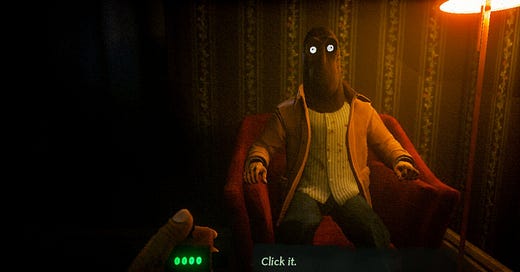CLICKOLDING: Counting the Moments
Strange Scaffold's newest effort maintains their run of fascinating titles, while coming off a bit undercooked
Warning: this piece contains full spoilers for Clickolding. Go buy it. It’s $3 and will take you about 30 minutes.
Strange Scaffold thrives in the margins. There’s no studio making games like them right now – each release a highly tuned experience to hone in on a distinct feeling. Many of their games sound like an elevator pitch from the highest guy in your dorm room, but there’s such care to their craft that each game feels like a promise. They really go for it – with El Paso, Elsewhere it was a dissection of addiction and abuse at the end of the world. With Life Eater, they investigated the violence of voyeurism. Even earlier releases like An Airport for Aliens Currently Run By Dogs sounds like a shitpost but is knocking at something much more profound about relationships and what it feels like to love someone you can never quite understand. It’s all this that makes me a bit sad to report that their newest project Clickolding, doesn’t quite land for me.
It's a hell of a pitch – Clickolding is a game where you are trapped in a hotel room with a masked man. He wants you to click a tally counter until it gets to ten-thousand and he will pay you for an unspecified surgery that you need. He wants to watch you click it, and will instruct you on different ways to click it until he’s satisfied. If the title somehow doesn’t give it away, there’s a sexual undertone throughout all this, but it’s always kind of on the periphery. You can tell that the man (henceforth referred to as “The Clickold”) in the corner is getting some sort of pleasure out of it, but there’s never any highly explicit dialogue nor imagery. For the most part, Clickolding actually delivers on this pitch – it’s unsettling, disempowering, and even a little boring at times in ways that work. My major issue with the game is that I feel it scratches at something so much stronger, but ultimately pulls a lot of the punches.
The Clickold is a man of bizarre proportions: many people jokingly refer to him as a moose without antlers and the comparison is quite apt – the mask looks less like it’s hiding a face and more a cartoonish nose complete with bulging, bilateral extropia eyes. He wears a jacket, boots, and no gloves. The striped shirt under his jacket is spotted with rust-red stains, which might be blood or something else. The specter of violence lies underneath, but it isn’t until around six-thousand clicks that The Clickold reveals that he does indeed have a gun, shows it to you, then puts it away behind the chair once again. The gun doesn’t appear again until the very end, which at approximately nine-thousand nine-hundred clicks, The Clickold asks you to sit on the bed. He produces the gun, places it to his temple, and tells you to keep clicking. Once you reach one-thousand, he has what appears to be an orgasm, and then he shoots himself.
I think this is ultimately the game’s greatest misstep, that violence is only promised when the game is half over, and the violence is never directed at the player. If you attempt to leave the room during the process, The Clickold simply says “if you go out that door, don’t bother coming back”. Confirm, and the game closes. If The Clickold is willing to die for this thrill, wouldn’t he also be willing to kill for it? Perhaps an outwardly violent “antagonist” isn’t what Strange Scaffold had in mind, and that’s fair, but The Clickold isn’t even all that forceful in his instructions. If he instructs you to stand in a specific spot, the game will not allow you to continue clicking until you do so. If you stand still, he simply repeats the instruction. Eventually control instructions will fade in to the bottom-left of the screen. It isn’t that Clickolding won’t allow you to disobey, it’s that disobeying doesn’t ratchet up the discomfort. The Clickold will never threaten you directly, “punish” you for not following instructions, or make you feel as though there are consequences to not listening. The game simply will not continue.
There are two main thematic sides to Clickolding, one is a theme of aging, of being too late in life to alter its course and the thrill of living vicariously through someone else, of deriving a sort of sick, jealousy-laden thrill of seeing someone do what you once could. The other is a metacommentary on skinner-box game design. The real thrill is right before you succeed, watching the number edge ever closer to the desired one before it turns over and gives you the next reward. The last few empty pixels in an experience bar.
For my money, the most powerful moment in Clickolding is fairly early on, where you reach nine-hundred and ninety-nine and The Clickold screams at you to stop. He holds out a shaking hand. He wants to savor this moment. You stare at each other in silence until he slowly falls back into his chair and tells you to keep going. It’s the first and last time the game truly surprised me – it made me wonder what would happen if I tried to click anyway, denied him his waiting, or stopped even when he said to continue. The answer is, it doesn’t let you, and he keeps repeating his instructions, respectively. I think Strange Scaffold really had an opportunity here to double down on the discomfort, to tap into something much darker that really fleshes out the thematic framing. Instead, Clickolding comes off kind of limp, an interesting proof-of-concept rather than the grand-slam the studio is normally known for.




